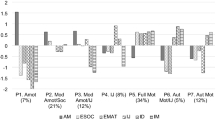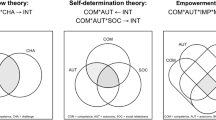Abstract
This study uses self-report measures completed by one hundred and twenty three (123) undergraduate technology students to investigate the validity of Peterson and Seligman’s (2004) classification system of 24 character strengths embodied in six core virtues. Using exploratory factor analyses we found, that an exact convergence of the character strengths was explicitly absent with the six-virtues. In our study, a five-factor solution was more comprehensive and well representing the resultant factor loadings upon analyzing the data which is further compared to a similar empirical study available for analyzing structural dynamics. In this paper, we have discussed the five-factor solution and renamed the dimensions to show a legitimate picture of the classification system, which requires further justification, and in addition, advocates reanalysis and reinterpretation of the originally propounded values in action (VIA) classification as a recommendation for future research.
Similar content being viewed by others
References
American Psychiatric Association (1994). Diagnostic and statisti-cal manual of mental disorders (4th ed.). Washington, DC: Author.
Biswas-Diener R (2006). From the equator to the North Pole: A study of character strengths, Journal of Happiness Studies, 7:293–310.
Cawley MJ, Martin JE & Johnson JA (2000). A virtues approach to personality. Personality and Individual Differences, 28(5):997–1013.
Csikszentmihalyi M, & Csikszentmihalyi IS (2006). A life worth living: Contributions to positive psychology. Oxford Univer-sity Press Inc.
Dahlsgaard K, Peterson C & Seligman MEP (2005). Shared virtue: The convergence of valued human strengths across culture and history. Review of General Psychology, 9(3):203–213.
Gable SL & Haidt J (2005). What (and why) is positive psychology? General Review of Psychology, 9(2):103–110.
Greenberger E, Josselson R, Knerr C & Knerr B (1975). The measurement and structure of psychosocial maturity. Journal of Youth and Adolescence, 4(2):127–143.
Linley PA, Maltby J, Wood AM, Joseph S, Harrington S, Peterson C, Park N & Seligman MEP (2007). Character strengths in the United Kingdom: The VIA Inventory of Strengths. Personality and Individual Differences, 43:341–351.
MacDonald C, Bore M & Munro D (2008). Values in action scale and the Big 5: An empirical indication of structure. Journal of Research in Personality, 42(4):787–799.
McCrae RR & John OP (1992). An introduction to the five-factor model and its applications. Journal of Personality, 60(2):175–215.
Park N, Peterson C & Seligman MEP (2004). Strengths of character and well-being. Journal of Social and Clinical Psychology, 23(5):603–619.
Peterson C & Seligman MEP (2004). Character strengths and virtues: A handbook and classification. DC: American Psycho-logical Association. New York: Washington, Oxford University Press.
Ryff CD & Singer B (1996). Psychological well-being: Meaning, measurement, and implications for psychotherapy research. Psychotherapy and Psychosomatics, 65:14–23.
Seligman M (2002). Authentic happiness. New York: Free Press.
Singh K & Choubisa R (2009). Psychometric properties of Hindi translated version of values in action inventory of strengths. Journal of Indian Health Psychology, 4(1):65–76.
Author information
Authors and Affiliations
Corresponding author
Rights and permissions
About this article
Cite this article
Singh, K., Choubisa, R. Empirical validation of values in action-inventory of strengths (VIA-IS) in Indian context. Psychol Stud 55, 151–158 (2010). https://doi.org/10.1007/s12646-010-0015-4
Received:
Accepted:
Published:
Issue Date:
DOI: https://doi.org/10.1007/s12646-010-0015-4




